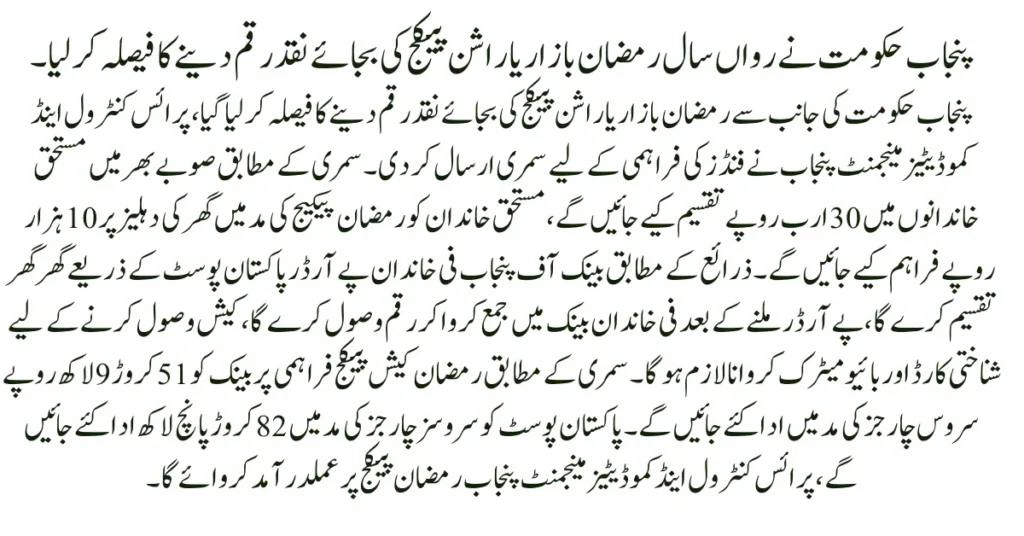As Ramadan approaches, the Punjab government has launched a new initiative to provide financial relief to low-income families. Instead of distributing traditional ration packages, the government has decided to offer Rs 10,000 in direct cash assistance to eligible families. This move aims to give recipients the flexibility to purchase essential items according to their individual needs, ensuring better financial support during the holy month.
Key Features of the Ramadan Cash Assistance Program
The Punjab government’s decision to replace food packages with direct cash assistance is a major shift in its welfare strategy. Under this scheme:
- Each eligible family will receive Rs 10,000 in cash.
- A total budget of Rs 30 billion has been allocated for the program.
- Funds will be distributed through the Bank of Punjab and Pakistan Post.
- Biometric verification will be conducted to ensure transparency and prevent fraud.
This initiative ensures that families can purchase food, clothing, or any other necessities according to their specific needs during Ramadan.
Also Read: Benazir Card: Eligibility, Account Opening and 13,500 PKR Payment Guide
Why Cash Assistance Instead of Ration Packages?
Traditionally, the Punjab government provided ration bags containing basic food items like flour, rice, and oil. However, this year, the focus has shifted to monetary aid for the following reasons:
- Flexibility for Families: Every household has different requirements. Some may need medical supplies, while others might prioritize fresh groceries. Cash assistance lets them choose.
- Avoiding Logistics Issues: Distributing food packages requires storage, transportation, and manpower. Cash assistance simplifies the process.
- Prevention of Corruption and Mismanagement: Direct cash transfers ensure that funds reach deserving families without middlemen exploiting the system.
This approach not only streamlines the relief process but also empowers families to spend according to their individual needs.

How Will Families Receive the Cash?
The Punjab government has partnered with the Bank of Punjab and Pakistan Post to handle the cash disbursement. Here’s how the process will work:
- Eligible individuals will receive pay orders issued by the Bank of Punjab.
- They will visit designated branches to collect their cash payments.
- Biometric verification and ID card checks will be conducted to prevent fraudulent claims.
By implementing a secure and transparent distribution system, the government aims to ensure that only deserving families benefit from this initiative.
Service Charges for Cash Distribution
To execute this program efficiently, the Punjab government has allocated service charges to the institutions involved:
- Rs 519 million to the Bank of Punjab for managing cash distribution.
- Rs 825 million to Pakistan Post for operational support.
These funds will cover administrative costs and ensure a smooth, timely, and corruption-free distribution of relief money.
Impact on Families and the Community
This Rs 10,000 Ramadan cash aid is a lifeline for many families struggling with inflation and rising food prices. Instead of worrying about how to afford daily meals, families can now focus on their spiritual and religious obligations during Ramadan.
Additionally, this initiative boosts local markets as people will spend their cash on essential goods, stimulating the economy.
Also Read: CM Punjab Laptop Scheme 2025: Delay Reasons and Latest Updates
Ensuring Transparency and Security
The Punjab government has implemented several measures to ensure that the cash relief reaches the right people:
- Biometric verification prevents duplication and fraudulent claims.
- ID card checks confirm the identity of beneficiaries.
- Strict monitoring and reporting mechanisms ensure fair distribution.
With these security protocols in place, the government aims to maintain public trust and ensure that relief funds are utilized effectively.
Final Thoughts
The Punjab government’s decision to provide Rs 10,000 in cash instead of traditional Ramadan ration packages is a progressive step toward financial empowerment. By offering direct assistance, families gain control over their purchases, reducing financial stress during Ramadan.
With a secure distribution system, transparent verification process, and a significant budget allocation, this initiative sets a new benchmark for welfare programs in the region. As a result, thousands of families will experience a more dignified and flexible form of support during the holy month.

